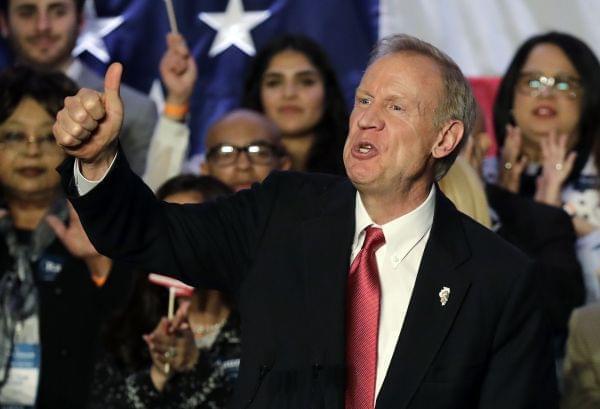Governor Bruce Rauner’s Bid For A Second Term

(AP Photo/Nam Y. Huh)
Governor Bruce Rauner is a Republican running for his second term in office. He recently spoke with Niala Boodhoo, host of The 21st, about his candidacy.
On whether he would have done anything differently during the budget impasse that lasted more than two years: Well, it's important, Niala, for all of your listeners to know that during the two year budget impasse, Speaker Madigan had a supermajority. He could have passed any budget he wanted, at any time, with or without my support. And he didn't pass any budget, not even an unbalanced budget, during the second year of the budget impasse. His goal was to cause the impasse to force an income tax hike, which he evantually was able to do.
That was tragic. He hurt a lot of people with his pursuit of that. But now, the good news for all of us is, we have a balanced budget, now we can move forward with incremental improvements and change, now we can grow the economy faster. Because the only way we'll keep balanced budgets, the only way we'll have the resources to fund our human services, to fund our schools, to fund all of our needs, is to have an economy that's robust and growing, and growing faster than our government spending.
That's what we need to achieve, and that's what I'm striving for during my first four years, as well as in my second term.
On whether he can work with state lawmakers if elected to a second term, especially given that Illinois went without a budget for more than two years during his first term: There are many good-hearted legislators, frankly, in both political parties in the General Assembly in Illinois. They've been intimidated and dominated by Madigan and his incredible power, and self-serving manipulation of the system. But down underneath, they know that what we need to do is right. They agree on most of the policies I've recommended, and I'm willing to compromise on things with them that I may not agree with, but as part of compromising and good faith, we can get it done.
That's how we finally got a balanced budget done. That's how we got property tax relief for veterans, and got an income tax reduction for families who adopt. That's how we got record school funding and a new education funding formula to help our lowest-income districts the most. That's how we got the Future Energy Jobs Acts done to enhance economic growth and options in the state of Illinois. That's how we expanded the U of I with a half a billion dollars so that they can grow in Champaign, and Rockford, and Peoria, and other areas, so we can grow the tech sector of our economy.
That's how we got Medicaid reform done so that we're now national leaders in mental health services. That's how we got criminal justice reform done so we're leaders in justice within our judicial system. We've made progress on a bipartisan basis, by working together, and we'll do even more of that in my second term.
On whether he'd change the current state personal income tax rate of 4.95 percent: What I want to do is bring it back down to three percent — where it was for decades—over the next four or five years, gradually. And how do we do that? We start off on getting pension reform done, that's going to save $2 billion a year. How do we do that? We get government health care reform that's going to save $750 million a year. How do we do that? We implement the government shared services, and conslidation and mandate relief, that my bipartisan task force, led by Evelyn Sanguinetti, recommended. If we did their recommendations, we could save $3.5 billion per year.
We don't need to cut human services. We don't need to cut education. We need to make government more efficient, effective, transparent, and with less bureaucracy. And if we do that, we've totaled up the savings—it could be $6 billion per year if we implemented all the recommendations that we put forth. If we did that, combined with faster economic growth, we could be like the states around us. They're running budget surpluses because their economy's growing faster than their government, and they're lowering their tax burden, not raising them. Kentucky cut taxes. Indiana. Wisconsin. We can do the same thing here. That's the way to a better future.
On what he'd say to immigrants in Illinois—many of whom have been afraid since President Trump took office: Well, I'll say this, I support comprehensive immigration reform. I always have and always will—I said it five years ago, and I work for that every day. That means encouraging, streamlinng, supporting legal immigation, and ending illegal immigration.
Illegal immigration is a huge problem in Illinois. Illegal immigration lowers wages, illegal immigration takes jobs away from Americans, illegal immigration increases unemployment for American workers, and it's been devastating for our African-American community, many of our lower-income communities that have struggled with unemployment—illegal immigration takes jobs away from them.

